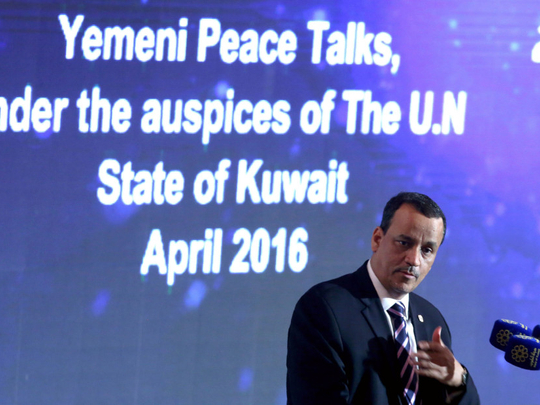
Al Mukalla: The UN Special envoy to Yemen, Esmail Ould Shaikh Ahmad, who is mediating between Yemen’s warring factions in Kuwait, has stopped direct talks, a tactic meant to end weeks of impasse.
“The UN envoy has suspended direct talks between our delegation and Al Houthis to save time and find common ground,” a Yemeni government official familiar with talks told Gulf News on Thursday.
The current talks between the delegation of the internationally-backed government delegation and Al Houthis kicked off last month and were meant to find a formula that would end the more than one year of violence.
However, Al Houthis have not been abiding by the agenda of the talks, frustrating the government delegation which has walked out several times.
“The UN envoy has found out in the face-to-face meetings we spend hours arguing and hurling accusations at each other. So, he decided not to bring us together in one room and alternatively discuss each delegation’s views separately,” the official said.
Last week, peace talks suffered a setback when the government delegation suspended participation when the rebel delegation refused to recognise the legitimacy of president Abd Rabbo Mansour Hadi.
They insist before discussing UN Security Council resolution 2216 which calls for their disarmament, withdrawal from occupied territory and the release of prisoners, that they discuss plans for a unity government.
Analysts believe Al Houthis could use the unity government to legitimate their coup and hold on to their arms.
“During our boycott of talks, the UN envoy extensively met with Al Houthis. Now, it is our turn. Our military experts briefed Ould Shaikh Ahmad about our plan for Al Houthis’ withdrawal from cities,” the official said.
The military experts proposed to divide Al Houthi-controlled territory into areas A (Sana’a, Taiz, Hodeida), B (Dhaleh, Bayhan, Baydha) and C (Ibb, Mahweet, remaining provinces).
They suggest the militants pull out of area A first and hand over their arms to a security committee formed by President Hadi.
Analysts remain pessimistic about the outcome of talks, despite words of optimism issued by the UN envoy.
“Al Houthis are dragging their feet over releasing prisoners and they are not taking steps to hand over the prisoners which they promised to happen in 20-days time. Ten days have passed already,” Mukhtar Al Rahabi, a former media aide to Hadi told Gulf News on Thursday.
“Al Houthis are using the peace talks to get a breather from Arab coalition air strikes,” he added.
On Wednesday, UN Secretary-General Ban Ki-moon proposed a plan to beef up the UN mediation in Yemen. He proposed expanding the staff of the UN peace mission to Yemen and moving it to Amman from New York to intensify the mediation.
The bigger UN team would provide technical expertise to the Yemeni parties on a range of issues, in particular on ways to shore up a ceasefire in force since April 10 that has led to a decrease but not a halt in attacks.
“The nationwide cessation of hostilities remains extremely fragile, and requires urgent additional support from the United Nations,” Ban wrote.
An upsurge in violence could “undermine the Kuwait talks and derail the progress towards greater stability and security”, he added.












